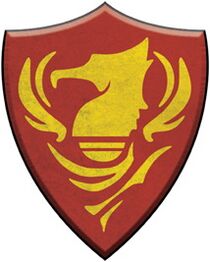Aurigan Coalition
This article needs to be updated with material from House Arano (The Aurigan Coalition). Once these titles clear the Moratorium period, or if they already have, please consider revisiting this article and updating it with the new material. |
| Aurigan Coalition | |
|---|---|
| State Profile | |
| Founding Year | 2910 |
| Dissolution year: | 3026 |
| Capital world: | Coromodir VI |
| Controlled system(s): | 23 |
| Government | |
| Head of State | High Lord |
| Military | |
| Army | Aurigan Coalition Military (ACM) |
The Aurigan Coalition is an interstellar nation located in the periphery region known as the Aurigan Reach, which borders on the Capellan Confederation and the Taurian Concordat, along with the Rimward Frontier space.[1]
For most of its existence, the Aurigan Coalition kept a low profile and was ignored as a state, to the point of being omitted from most contemporary starmaps. This may have been because it was considered a mercantile coalition over a political one and not taken seriously as a real state, or because of the relatively low populations and industrial base of its constituent worlds, or a combination of both.
Contents
History
Aurigan Coalition
Under the rule of the oligarchic Founding Council and the High Lieges from their number, the Aurigan coalition expanded into the Frontier Reach, and fended off piracy. The Aurigan people enjoyed various political, personal and economic rights across the Coalition to the point that they were considered something to be championed by Kamea Arano when she led the Arano Restoration during the Aurigan Civil War.
Directorate
High Lord Tamati Arano II and his wife Serena Arano (née Espinosa) were killed in an accident in 3022, leaving their daughter Kamea as heir. With Kamea refusing to listen to her uncle about how to rule the Coalition, Santiago Espinosa decided to take matters into his own hands. Along with his daughter, Victoria Espinosa, he would successfully stage a coup, forcing Lady Arano off Coromodir and taking the throne, installing himself as "Director" of the realm.
| “ | We are here today because if Lady Arano will not act, someone must. I know what I am asking of you. You will face former comrades or even loved ones on the battlefield. I take up arms against my own niece. But remember: today we sacrifice, so that tomorrow we can return our kingdom to its proper glory. To its proper strength! So should you fall tonight - know that you did so as true heroes of the Reach! To your stations! For the Directorate!" | ” |
- Lord Santiago inspiring his Directorate troops before deploying on Cormodir.
As ruler of the rechristened Aurigan Directorate, Santiago would form a brutal dictatorship in his wake, creating concentration camps on Weldry to hold possible dissident factions' relatives hostage including of the Founding Houses, and torturing and murdering political prisoners. His daughter, Victoria would slaughter anyone who did not support the Directorate, whether it be civilians or other House Lords of the Reach. Further, on Cormodir personal and political liberties were lost in exchange for increased economic luxuries under the police state in order to placate the population.[1]
Aurigan Civil War
Politics
The Council of Founding Houses is the name given to the nobles who oversaw the Aurigan Coalition. The following Houses were members of the Founding Council.[2]
Rulers
| Name | Reign | Descent |
|---|---|---|
| Aurigan Trade Partnership | ||
| Governor | Wiremu Arano | 2820[1] |
| Aurigan Coalition | ||
| High Lady | Keona Arano | 2910 - ****[1] |
| High Lord | Tamati Arano I | **** - 2988 |
| High Lord | Tamati Arano II | 2988 - 3022 |
| Aurigan Directorate | ||
| Director | Santiago Espinosa | 3022 - 3025[3] |
| Aurigan Coalition | ||
| High Lady | Kamea Arano | 3025 - |






